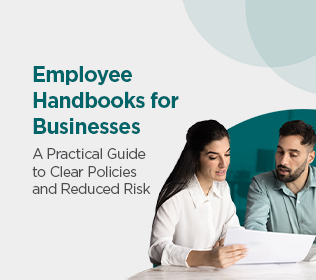
As an employer, it is imperative to understand and comply with overtime pay laws under the Fair Labor Standards Act and subsequent updates.
Employers have many regulations to follow, and one of the most important is overtime pay. Labor laws ensure workers are treated fairly, and this includes the pay they receive for working above the set national threshold for hours worked per week.
When certain employees work more than 40 hours in a standard workweek of 168 hours, they may be entitled to overtime pay. However, only certain types of employment and employers are covered under the law.
Discover what laws you need to know, how overtime pay works and what exempt versus non-exempt employment means.
Your Guide to Overtime Pay Laws

The Fair Labor Standards Act
The Fair Labor Standards Act established overtime pay laws, and additional final rules in 2019 and 2024 have introduced updates.

Exempt Employees
Exempt employees do not all under overtime pay regulations.

Stay Current
Stay current with changes to the law, and work with an expert when you need compliance help.
Overtime pay laws and updates
Legislation called the Fair Labor Standards Act (FLSA) originally put laws in place concerning overtime pay.
The FLSA regulations are meant to ensure that employees who work more than a standard workweek are compensated for their extra time.
In 2019, the Department of Labor (DOL) issued a final rule, which included specific salary requirements for employees who are covered under the overtime pay laws. Any employee with non-exempt status who works more than 40 hours in a week needs to receive time and a half (at least) of their regular wage for those extra hours worked.
In 2024, the DOL introduced another final rule. This rule increases the minimum salary requirements for employees who are exempt from the FLSA’s overtime requirements. Starting on July 1, 2024, the minimum threshold for salaries will be $43,888 (up from $35,568), and then on January 1, 2025, that number will increase to $58,656.
Next, we’ll cover overtime pay requirements.
Exploring overtime pay requirements
Overtime pay regulations are fairly straightforward: Non-exempt employees who work more than 40 hours in a standard workweek get at least time and a half pay for the additional hours. What is an exempt versus non-exempt employee?
“Exempt” and “non-exempt” refer to whether or not employees are covered under the FLSA or state-specific overtime laws. Non-exempt employees are covered while exempt employees are not.
To be considered exempt and receive a salary, that salary has to be at least $684 a week, with a minimum of $43,888 per year beginning on July 1, 2024, and $58,656 beginning in 2025. Typically, salaried exempt workers need to be working in an executive, administrative or professional manner, where they are closely connected to decision-making in the company or in the organization’s operations.
Employees who do not fit into these exemptions, including hourly wage earners, are considered “non-exempt” and are covered by overtime pay laws.
Note that overtime pay doesn’t apply to weekends or holidays unless an employee works overtime on those days. The employee should be paid the overtime amount on their normal payday for the applicable pay period.
How can employers ensure compliance with overtime pay regulations? We’ll uncover that next.
Exempt Employees include:
Salaried workers who earn a set salary instead of hourly wages
Freelancers or independent contractors
Volunteers for an organization
Seasonal employees
Certain newspaper employees
Some farm workers
Investigators
Certain types of caregivers
Compliance tips for employers
If you fail to understand or comply with the FLSA and any updates, you may risk a lawsuit from an employee or other legal issues. These tips will help you stay compliant:
1. Improve recordkeeping and payroll practices
Your organization must have clear, accurate and up-to-date records about all employees and payroll. This includes wages or salaries and whether they’re exempt or non-exempt. Important processes must then be implemented to ensure you’re paying overtime when needed and calculating these amounts properly.
Compliance begins with strong documentation practices.
2. Understand your employees’ rights
While labor laws may seem cumbersome, they are in place to protect employees from mistreatment. Remember that the FLSA and subsequent rules give employees the right to receive overtime pay if they’re non-exempt and work more than a normal workweek. If you fail to provide the correct amount of overtime pay, they could initiate a claim against you.
3. Carefully review law updates
It is vital to pay attention to updates, amendments and new rules that relate to overtime pay. As is the case in 2024, it may become common for the minimum salary threshold to increase, for example. The law may continue to be updated to further protect employees when unforeseen workplace problems arise.
4. Work with a compliance expert
Because compliance is so important and potential consequences could be dire, consider working closely with a compliance expert. These professionals will work alongside your team to review your Human Resources practices, offer solutions and continually monitor labor laws for changes that impact you and your employees.
Overtime pay laws, though seemingly straightforward, contain complexities. Let’s dive into some common questions about them below.
FAQs about overtime pay laws
There are many questions and myths about overtime pay. Here are some of the most common questions with answers:
Do all employees receive overtime pay?
No. Only non-exempt employees – typically those who earn an hourly wage or earn a salary under the minimum threshold – receive overtime pay.
When would non-exempt employees receive overtime pay?
Overtime pay applies to non-exempt employees who exceed the standard 40 hours in one workweek.
Does the overtime pay rate apply to all wages worked in a week?
No. Overtime pay is calculated only for the hours worked outside the initial 40 hours for that week. So, say an employee worked 50 hours in one week, and their regular hourly wage is $20 per hour. Here is how you would calculate it:
- 40 hours would be paid at $20 per hour, the normal wage.
- 10 hours would be paid at $30 per hour, which is equal to time and a half.
Do all employers have to pay overtime?
No. Employers that must comply with the FLSA have at least $500,000 in annual sales, or the company engages in interstate commerce. However, pay attention to your local state laws. Some states have laws in place that require smaller businesses to provide overtime pay.
What is considered a workweek under the FLSA?
A standard workweek is seven consecutive periods of 24 hours, as defined by the DOL. It is a “fixed and regularly recurring” 168-hour period.
Finding support with overtime pay compliance
You want to do everything you can to avoid legal issues related to employment. You also want to ensure your employees are treated fairly and are satisfied with their work conditions. Overtime pay laws under the FLSA ensure certain employees are compensated for working more than the standard workweek, which can help ensure engagement and productivity. Failing to comply could mean a lawsuit.
Fortunately, professional help and guidance are available to support with overtime pay, payroll, compliance or any Human Resources requirement. The team at PrestigePEO is here to assist you with any of these needs and more.
Reach out to PrestigePEO to discover how we can help.




